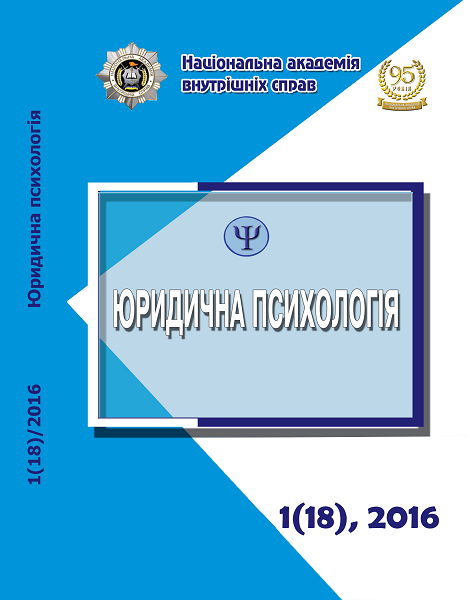Methodological principles of study of emotional intelligence of employees of internal аffairs bodies
Keywords:
patrol police officer, communicative strategy, speech sphere duties
Abstract
The article is devoted to methodological bases to identify of individuals, who are prone to psychosomatic disorders. The author explains that there are two significantly different profiles of the dominant emotional experiences in individuals that are prone and not prone to psychosomatic disorders. In the first case, a positive emotional state has been recorded as the view of certain professional regulation («the employee of police has to be...»), since they are unlikely at this level of negative emotions. Moreover, the desire to be (or look) of energetic, determined and confident person for the lack of appropriate personal requirements can cause personal conflict, to become an independent factor of negative dynamics of the psychosomatic status of an individual. In the second case there is a domination of positive emotions, respectively – the overall harmony of the emotional status of the person despite the presence of negative influences.Downloads
Download data is not yet available.
Abstract views: 154 PDF Downloads: 86
Issue
Section
Psychological support of law enforcement
- Authors reserve the right to authorship of their own work and transfer to the magazine the right of the first publication of this work under the terms of the Creative Commons Attribution License, which allows other persons to freely distribute published work with mandatory reference to authors of the original work and the first publication of an article in this magazine.
- Authors have the right to enter into separate additional agreements on non-exclusive dissemination of the work in the form in which it was published in the journal (for example, to post an article in the institution's repository or to publish as part of a monograph), provided that the link to the first publication of the work in this journal is maintained.
- The journal's policy allows and encourages the posting of articles by authors on the Internet (for example, in electronic storehouses of institutions or on personal websites), both before the submission of this manuscript to the editorial office and during its editorial processing, as this contributes to the creation of a productive scientific discussion and positively affects the efficiency and dynamics of citing the published work.




